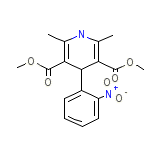Cardilat




Cardilat Brand names, Cardilat Analogs
- Adalat
- Adalat 10
- Adalat 20
- Adalat 5
- Adalat CC
- Adalat CR
- Adalat Crono
- Adalat Ft
- Adalat Gits
- Adalat Gits 30
- Adalat LA
- Adalat LP
- Adalat Oros
- Adalat PA
- Adalat Retard
- Adalate
- Adapine
- Adapress
- Alat
- Aldipin
- Alfadal
- Alonix
- Alonix S
- Alpha-Nifedipine Retard
- Angipec
- Anifed
- Anpine
- Apo-Nifed
- Aprical
- Bonacid
- Calcibloc
- Calcigard
- Calcilat
- Camont
- Cardifen
- Cardilat
- Cardilate
- Cardionorm
- Chronadalate
- Chronadalate Lp
- Citilat
- Coracten
- Coral
- Cordafen
- Cordaflex
- Cordalat
- Cordicant
- Cordilan
- Cordipin
- Corinfar
- Corotrend
- Corynphar
- Depin
- Dignokonstant
- Dilafed
- Dilcor
- Dipinkor
- Duranifin
- Ecodipi
- Ecodipin
- Ecodipin E
- Fedcor
- Fedcor Retard
- Fenamon
- Fenamon Sr
- Fenihidin
- Fenihidine
- Glopir
- Hadipin
- Hexadilat
- Introcar
- Kordafen
- Macorel
- Megalat
- Myogard
- N1fedilat
- Nedipin
- Nicardia
- Nifangin
- Nifar
- Nifdemin
- Nifebene
- Nifecard
- Nifecor
- Nifedepat
- Nifedicor
- Nifedin
- Nifedine
- Nifedipine Retard
- Nifedipres
- Nifedirex LP
- Nifelan
- Nifelat
- Nifelat Q
- Nifelate
- Nifensar XL
- Nificard
- Nifidine
- Nifipen
- Niphedipine
- Orix
- Oxcord
- Pidilat
- Procardia
- Procardia XL
- Sepamit
- Tibricol
- Zenusin
Cardilat Brand Names Mixture
- No information avaliable
Cardilat Chemical_Formula
C17H18N2O6
Cardilat RX_link
http://www.rxlist.com/cgi/generic2/nifedip.htm
Cardilat fda sheet
Cardilat msds (material safety sheet)
Cardilat Synthesis Reference
Bossert, Vater, U.S. Pat. 3,485,847 (1969)
Cardilat Molecular Weight
346.335 g/mol
Cardilat Melting Point
172 - 174 oC
Cardilat H2O Solubility
Insoluble
Cardilat State
Solid
Cardilat LogP
2.343
Cardilat Dosage Forms
Capsule; Tablet; Tablet (extended-release)
Cardilat Indication
For the management of vasospastic angina, chronic stable angina and hypertension.
Cardilat Pharmacology
Nifedipine, the prototype of the dihydropyridine class of calcium-channel antagonists, is similar to other dihydropyridines including amlodipine, felodipine, isradipine, and nicardipine. Nifedipine is used to treat Prinzmetal's angina, hypertension, and other vascular disorders such as Raynaud's phenomenon. By blocking the calcium channels, Nifedipine inhibits the spasm of the coronary artery and dilates the systemic arteries, results in a increase of myocardial oxygen supply and a decrease in systemic blood pressure.
Cardilat Absorption
Rapidly and fully absorbed following oral administration.
Cardilat side effects and Toxicity
Symptoms of overdose include dizziness, drowsiness, nausea, severe drop in blood pressure, slurred speech, and weakness. LD50=494 mg/kg (orally in mice); LD50=1022 mg/kg (orally in rats)
Cardilat Patient Information
Cardilat Organisms Affected
Humans and other mammals














